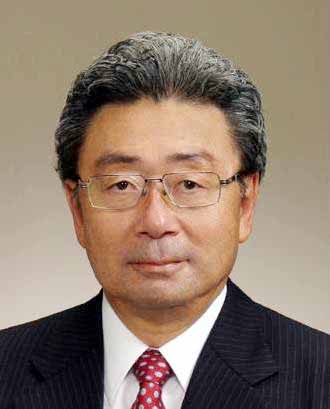Welcome Message
- Welcome Message
- Details: Program, Registration fees…etc.(PDF)
- Entrance for Online Registration
The 2013 Annual Meeting of Japan Society for Bioscience, Biotechnology and Agrochemistry
TERUO MIYAZAWA

I would like to say a few words about the staging of the 2013 Annual Meeting of Japan Society for Bioscience, Biotechnology and Agrochemistry.
The 2013 Annual Meeting will be held in Sendai City for 5 days from March 24 (Sunday) to 28 (Thursday). Many members from all over the country will gather here in Tohoku and it is my wish that we all make good use of our time together during this meeting.
All the members in the planning committee have worked hard to prepare for this event. This is the first time in 11 years, since 2002, that our annual meeting has been held at our Tohoku branch. The day's schedule for 2002 was exactly the same as ours this time, but back then we had kindly been allowed to use the Tohoku Gakuin University's Izumi Campus in the northern part of Sendai City. I was in charge of general affairs for the planning committee that year and I still remember having a hard time arranging busses and venues.
On a schedule decided in the 2010 board meeting to hold the 2012 annual meeting in Sendai, we formed the planning committee primarily from members of the Tohoku University, decided the program schedule and venues, and earnestly proceeded with our planning. However, on March 11, 2011, the Great East Japan Earthquake struck, causing unprecedented damage to our country.
On that day, I was participating in an international symposium on carotenoid at the Human Nutrition Research Center on Aging at Tufts University in Boston. I saw the extremely vivid television coverage of the earthquake, tsunami and nuclear accident in Japan and hurriedly headed home. At that time, my American, Chinese and European friends encouraged me to endeavor to use Japan's latent power and world's top ability of science technology, which incredibly restored our post-war society and brought an economic boom, to show the world a model for a post-earthquake sound recovery.
As soon as I returned to Japan, I exchanged opinions with Former (then current) Chairman Shimizu and Chairman (then vice-chairman) Ohta as to our countermeasures at the office of our society. Chairman Ohta's suggestion was to postpone the Sendai meeting and hold the annual meeting in Kyoto two years in a row because participants would have to pass through Fukushima in which the recovery from radiation would be lingering.
I promptly asked the members of the planning committee from Tohoku University to check the possibility of utilizing their venues if we postponed the meeting until next year. When I received the one-year postponed proposal from the results, the plan went forward. It was during this time when young professors of the planning committee shared with me a lot of encouraging opinions which appreciated the preparation we had done until now and gave a chance to our own members from all over the country to view the Tohoku reconstruction of post-earthquake themselves.
Of course, once I undertook the planning of the annual meeting, it was not ideal that it was pushed back to a later date. Therefore, I went back to Sendai and reorganized the planning committee to focus on the 2013 meeting, which continues to this day.
The main themes of the annual meeting in Sendai are "NOUGEIKAGAKU (Bioscience, Biotechnology and Agrochemistry) contribution to an aging society with a declining birthrate, collaboration between agrochemical studies and industries, and the role of NOUGEIKAGAKU studies in the wake of the earthquake." We hope to vividly show the remarkable development of modern NOUGEIKAGAKU which is aiming at understanding life and its application on the basis of research results in various fields.
On the first day of the annual meeting, the 24th, we will have a morning symposium on chemistry and living beings at the Koyo Grand Hotel on Hirose Street in Sendai, and in the afternoon we will have an award ceremony and awardees' lectures at the nearby Denryoku Hall. After that, we will have a reception at the Koyo Grand Hotel. General lectures, luncheon seminars, luncheon symposiums, and exhibitions on devices, reagents, and books, etc. will be held from the 25th to the 27th and a public symposium on the 27th.
The Meeting of Junior Society for Bioscience, Biotechnology and Agrochemistry will be held on the afternoon of the 25th; the JABEE luncheon on the 26th, the forum and mixer of the academic exchange committee between government, industry and university on the afternoon of the 26th, and the Agrochemistry Frontiers symposium will be held for one night and two days at the Resort Hotel Crescent in Akiu Hot Spring on the 27th and 28th.
The general lectures of the annual meeting will give verbal presentations at venues with projectors and document cameras. We earnestly hope that through the origination and reception of new information at the annual meeting will spark a lively debate that will create a new research network.
We faced the earthquake that caused devastations and shock never experienced, on the other hand, the level-headed Japanese response has been admired by the worldwide media, and through their working together to earnestly restore the damage, we have learned to see hope in the coming days.
We are very grateful to many companies and groups that have supported us with donations, exhibitions, luncheon seminars and advertising.
The Tohoku University's Kawauchi Campus is located at the site of Ninomaru of Aoba Castle built by Lord Masamune Date. Surrounded by the Aoba mountain and the Hirose River, it has the most historically rich view in Sendai. We hope that when the beautiful flowers bloom in March, our members will gather from all over the country to recovered and bustling Sendai, an academic city of Tohoku.






